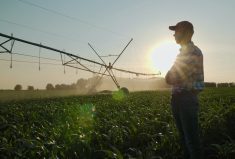Glacier FarmMedia – Give farmers something they can work with.
Give Canada’s agriculture and food industries something they can work toward.
That’s how you’ll get them on-side with greenhouse gas reduction goals. Right now, there’s not much to make them care or to feel there’s a point in participating. With “intensity” spurned by the enviro-lords, what’s a farmer to do?
Read Also

Deep cuts to ag research jeopardize Canada’s farming future
The huge cuts to ag research at Agriculture Canada are being widely panned by farm organizations, but there seems to be little hope of the government reversing its decision.
When it comes to the futility around climate change discussions, much goes back to the absence of a reasonable-sounding approach that can be embraced by consumers, farmers, service providers, industry and government.
Sure, some among us are comfortable with huge, costly transformations of our economy and society, so long as somebody else is paying the bill. As soon as somebody needs to foot the bill themselves, it’s a different matter and things go nowhere.
To the question of “how much are you willing to pay for what you’re demanding?” most people have the same answer for climate change as they do for taxes, social justice, better policing, improved highways and sending humans to Mars.
“Well, I can’t afford to pay for that. The costs have to be paid by the bad-doers.” That’s the typical “not me” answer.
But isn’t that the problem? We’re all bad-doers. If any of us are sincere about reaching GHG reduction goals, we’re all going to have to sacrifice.
Fossil fuel-producing and food-exporting countries resent being blamed for the emissions their industries (including farmers) produce, when what they emit is in aid of supplying products, like food and energy, to the importers, who tend to be the ones pointing the finger.
Countries with gigantic infrastructures of power generation and transmission – that’s us – complain about the incredible cost of re-engineering everything on a short timeline. People in developing countries complain that they can’t afford to pay for “green” power generation, so the developed nations need to pay them to build it, or else they’ll burn coal like we did in the old days.
I walk my dogs past large, old, single-detached houses with Greta Thunberg and Consider Climate signs in their front yards, signalling their objection to people living the way they do.
I’ve known environmentalists who work in the middle of the city but commute from ex-urban acreages because they “prefer that lifestyle.”
We’ve just witnessed tens of thousands of people jetting across the planet, as they do each year, to attend another COP environmental summit, staying in perfectly air-conditioned Dubai luxury hotels and then marching out and telling us we’re bad and need to change. (Perhaps next year the conflab could be done over Zoom.)
In this reality, it’s pretty hard to ask anybody in farming to willingly sacrifice anything. What’s the point?
Rather than this endless orgy of values-signalling that so many of us seem unable to break away from, perhaps we could offer reasonable people like farmers something they could work with.
How about recognizing and rewarding them for having the best environmental competitive advantage in whatever crops and livestock they produce?
What if we rewarded farmers and the food industry for having reached their greatest comparative environmental advantage in production, and for embracing everything they could in GHG reduction?
It’s fantastical when people speak about eliminating fossil fuel consumption by 2050, or whatever this week’s target is. It’s not even a reasonable goal. Fossil fuel production isn’t bad if it doesn’t damage the environment more than other energy sources.
That’s why the debate among the reasonable has shifted to the notion of “abatement,” which contains the carbon-capture concept. Yet, there is pushback against this for various reasons, plus an underlying discomfort with accepting a formerly resisted thing, and naked hypocrisy.
Farmers want to be good stewards of the climate. They want to be good citizens of this spinning ball of humanity we call home. But they need some reasonable goals.
Give them achievable and rewarded goals to work toward and they’ll gear up, dig down and figure out how to do things more GHG-efficiently.
Expect them to undermine their own sustainability in order to satisfy ludicrously fantastical imaginings of hypocrites and you’ll get the same shrugged shoulders with which most of us treated COP28.
– Ed White is a reporter with the Western Producer.















